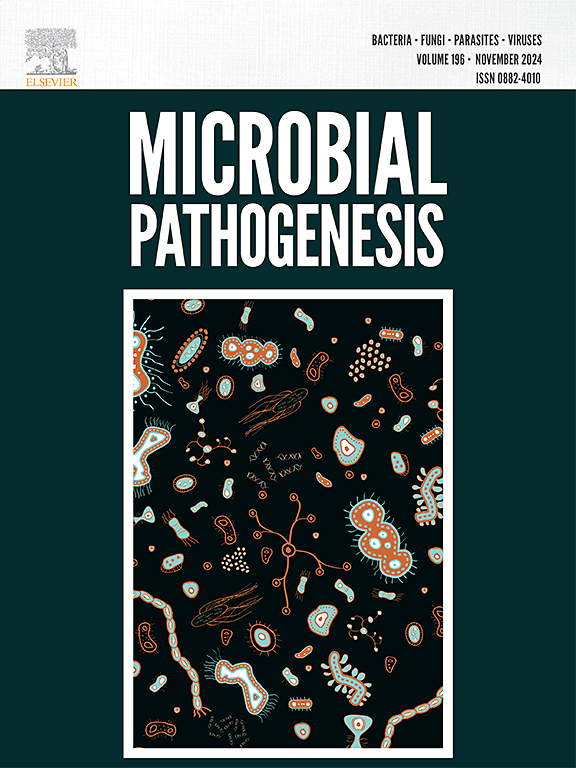转录组分析揭示了 miR-19b 对牛乳腺上皮细胞炎症的调控作用。
IF 3.3
3区 医学
Q3 IMMUNOLOGY
引用次数: 0
摘要
微RNA(miRNA)参与各种生物过程,对mRNA的表达进行调控。牛乳腺上皮细胞(bMECs)是介导乳腺炎症免疫的功能细胞。虽然有许多 miRNA 可调控 bMECs 的功能,但 miR-19b 在 bMECs 中的作用尚未见报道。本研究通过 RNA-seq 分析了过表达 miR-19b 的 bMECs 的转录组。此外,还分析了差异表达基因(DEGs),以确定 miR-19b 在 bMECs 中的作用。结果发现,miR-19b过表达组与阴性对照组之间存在269个DEGs,包括199个上调基因和70个下调基因。基因本体和京都基因组百科全书富集分析表明,DEGs通过金黄色葡萄球菌(S. aureus)感染和磷脂肌醇3-激酶(PI3K)-Akt信号通路调控免疫和炎症反应。此外,miR-19b的表达在脂磷酸(LTA)诱导的bMECs中明显上调,过表达miR-19b能负向调节炎性细胞因子IL-1β和IL-6的表达,从而减轻LTA诱导的bMECs的炎症反应。基于上述结果,我们推测 miR-19b 可能会抑制金黄色葡萄球菌引起的奶牛乳腺炎症,而这一过程可能是通过调控相关基因表达和信号通路介导的。本研究的发现为分析 miR-19b 在 bMECs 中的分子调控提供了新的参考。本文章由计算机程序翻译,如有差异,请以英文原文为准。
Transcriptome analysis reveals the regulation of miR-19b on inflammation in bovine mammary epithelial cells
MicroRNAs (miRNAs) are involved in various biological processes where they regulate the expression of mRNAs. Bovine mammary epithelial cells (bMECs) are functional cells that mediate mammary inflammatory immunity. Although numerous miRNAs regulate the function of bMECs, the role of miR-19b in bMECs has not been reported. In this study, the transcriptome of miR-19b overexpressed bMECs was analyzed by RNA-seq. Additionally, the differentially expressed genes (DEGs) were analyzed to establish the role of miR-19b in bMECs. The results revealed 269 DEGs between the miR-19b overexpression group and the negative control, including 199 up-regulated and 70 down-regulated genes. Gene Ontology and Kyoto Encyclopedia of Genes and Genomes enrichment analyses revealed that the DEGs regulated immune and inflammatory responses through Staphylococcus aureus (S. aureus) infection and phosphatidylinositol 3-kinase (PI3K)-Akt signaling pathway. In addition, the expression of miR-19b was significantly upregulated in lipophosphoric acid (LTA)-induced bMECs, and overexpression of miR-19b negatively regulated the expression of inflammatory cytokines IL-1β and IL-6, thereby alleviating the inflammatory response of LTA-induced bMECs. Based on the above results, we speculate that miR-19b may inhibit in dairy cow mammary inflammation caused by S. aureus, and this process may be mediated through the regulation of relevant gene expression and signaling pathways. The findings from this study provide a new reference for analyzing the molecular regulation of miR-19b in bMECs.
求助全文
通过发布文献求助,成功后即可免费获取论文全文。
去求助
来源期刊

Microbial pathogenesis
医学-免疫学
CiteScore
7.40
自引率
2.60%
发文量
472
审稿时长
56 days
期刊介绍:
Microbial Pathogenesis publishes original contributions and reviews about the molecular and cellular mechanisms of infectious diseases. It covers microbiology, host-pathogen interaction and immunology related to infectious agents, including bacteria, fungi, viruses and protozoa. It also accepts papers in the field of clinical microbiology, with the exception of case reports.
Research Areas Include:
-Pathogenesis
-Virulence factors
-Host susceptibility or resistance
-Immune mechanisms
-Identification, cloning and sequencing of relevant genes
-Genetic studies
-Viruses, prokaryotic organisms and protozoa
-Microbiota
-Systems biology related to infectious diseases
-Targets for vaccine design (pre-clinical studies)
 求助内容:
求助内容: 应助结果提醒方式:
应助结果提醒方式:


